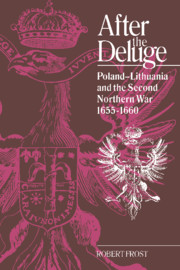Book contents
- Frontmatter
- Contents
- Preface
- Gazeteer
- Glossary
- Office holders
- List of abbreviations
- Pronunciation guide
- Genealogical tables
- Maps
- 1 Introduction: Poland—Lithuania in the midseventeenth century
- 2 The Deluge
- 3 Recovery: July 1655-August 1656
- 4 The widening conflict: June-December 1656
- 5 Constructing a coalition: January-December 1657
- 6 The succession and the failure of the coalition: January—July 1658
- 7 Political reform
- 8 Towards a French candidature: 1658–1660
- 9 Conclusion: the succession and the failure of reform
- Bibliography
- Index
- CAMBRIDGE STUDIES IN EARLY MODERN HISTORY
8 - Towards a French candidature: 1658–1660
Published online by Cambridge University Press: 04 November 2009
- Frontmatter
- Contents
- Preface
- Gazeteer
- Glossary
- Office holders
- List of abbreviations
- Pronunciation guide
- Genealogical tables
- Maps
- 1 Introduction: Poland—Lithuania in the midseventeenth century
- 2 The Deluge
- 3 Recovery: July 1655-August 1656
- 4 The widening conflict: June-December 1656
- 5 Constructing a coalition: January-December 1657
- 6 The succession and the failure of the coalition: January—July 1658
- 7 Political reform
- 8 Towards a French candidature: 1658–1660
- 9 Conclusion: the succession and the failure of reform
- Bibliography
- Index
- CAMBRIDGE STUDIES IN EARLY MODERN HISTORY
Summary
If the monarchy's reform plans, based on an increase in the power of the senate council, were to succeed, it would have to confront the problem of independent magnate power which had frustrated all its efforts between 1648 and 1655. Given the king's political and financial dependence upon the magnates, it was difficult to see how this could be achieved unless the monarchy were able to raise itself sufficiently above the magnate factions to dominate them and make it as dangerous for a Radziwill or a Lubomirski to oppose royal power as it had proved for Radziejowski. Moreover, it was not just the diet which was capable of placing restrictions upon royal power. The principle of free election of the king after the death of his predecessor meant that at regular intervals the Crown lost control of the political situation. From the death of one king to the coronation of the next, the royal patronage machine was suspended and the monarchy was unable to exert any influence upon the political struggle. It was royal elections above all which ensured the continuing and increasing weakness of the monarchy.
- Type
- Chapter
- Information
- After the DelugePoland-Lithuania and the Second Northern War, 1655–1660, pp. 152 - 167Publisher: Cambridge University PressPrint publication year: 1993

